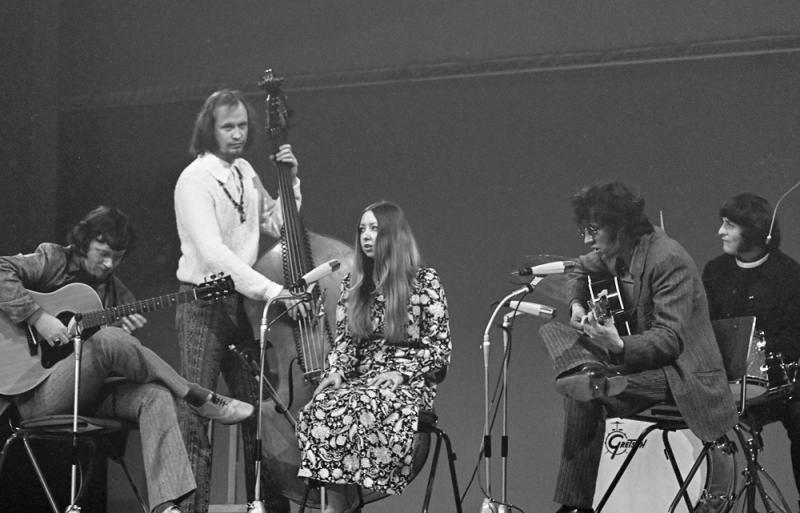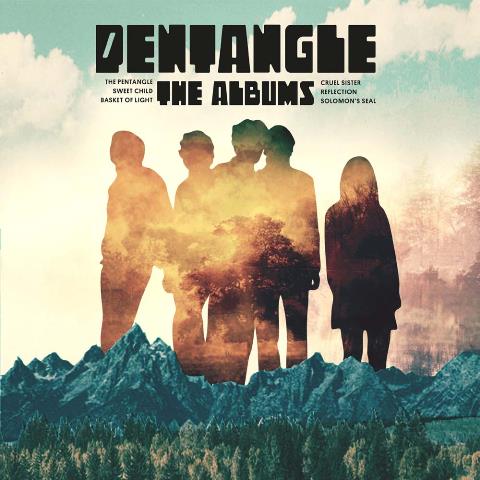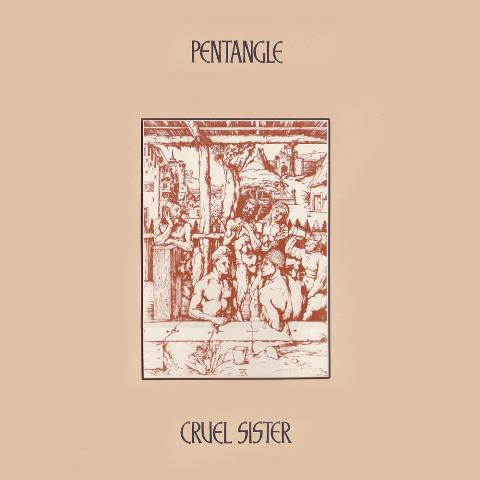Reissue CDs Weekly: Pentangle | reviews, news & interviews
Reissue CDs Weekly: Pentangle
Reissue CDs Weekly: Pentangle
Bonus-stuffed complete-works box set dedicated to Britain’s important musical boundary pushers

A nineteen-minute adaptation of “Jack Orion” took up the whole of Side Two of Cruel Sister, Pentangle’s fourth album. It's the highlight of the smart but blandly titled 115-track box set The Albums 1968–1972. Up to this point in 1970, British folk rock had not spawned anything comparable to the epic “Jack Orion”.
Bert Jansch, Renbourne’s guitar playing foil in Pentangle, had in 1966 already issued a ten-minute “Jack Orion” on his solo album of the same name. Renbourne played on the track. That album was produced by Bill Leader. So was Cruel Sister, the first album Pentangle made without Shel Talmy as their producer.
 As the band’s first album to solely feature traditional material, all this posits Cruel Sister as concluding unfinished business for some of Pentangle’s members. Back in 1966 though, no one would have thought of stretching a song to 19 minutes – on record, anyway. And back then too, Renbourne was not playing the electric guitar he would contribute to the Cruel Sister “Jack Orion”. Elsewhere, on the album’s title track, Renbourne played sitar.
As the band’s first album to solely feature traditional material, all this posits Cruel Sister as concluding unfinished business for some of Pentangle’s members. Back in 1966 though, no one would have thought of stretching a song to 19 minutes – on record, anyway. And back then too, Renbourne was not playing the electric guitar he would contribute to the Cruel Sister “Jack Orion”. Elsewhere, on the album’s title track, Renbourne played sitar.
Pentangle were not alone in testing boundaries. At the end of the Sixties, British folk and folk rock had evolved, and sticking with stylistic templates was no longer obligatory. The Incredible String Band – who also featured the sitar – had shown this, as had Fairport Convention on Liege & Lief, released in December 1969 and often deemed as ground zero for British folk rock (their previous album, July 1969’s Unhalfbricking had set the template).
Liege & Lief's impact on Pentangle is moot but Pentangle's membership blurred boundaries from the off. Although Jansch and Renbourne were identified as folk musicians, as was Pentangle’s singer Jacqui McShee, their double bassist was the blues-influenced jazzer Danny Thompson and their drummer Terry Cox’s background was in rock.
This mix and match approach was in the music from the beginning. Pentangle’s May 1968 eponymous first album included traditional British material and a version of The Staple Singers’ “Hear my Call”. Its follow-up, November 1968’s Sweet Child set blues in the form of Furry Lewis’ “Turn Your Money Green” alongside jazz with a cover of Charles Mingus’ “Goodbye Pork Pie Hat”. November 1969’s Basket of Light, their third long player, opened with “Light Flight (Theme From ‘Take Three Girls’)” which, as a single, took them into the charts. Next came the all-traditional yet boundary pushing high-point Cruel Sister. After this, October 1971’s Reflection which included interpretations of traditional American material. Getting a handle on the ever-shapeshifting Pentangle is not easy.
 The Albums 1968–1972 does not make characterising Pentangle easier. Their six albums are collected and supplemented with the customary mass of bonus tracks, most of which are alternate versions. About half are previously unreleased. Each of the seven discs comes in a reproduction of the sleeve of the relevant album. They are collected in a tray which slots into an outer slipcase. Everything has been remastered anew. The story is told in a smart book including essays on each album, a diary style chronology, an introductory text and an oral-history style overview of the band’s history. The radio and television recordings issued on the 2007 four-disc set The Time Has Come 1967-1973 are not reprised.
The Albums 1968–1972 does not make characterising Pentangle easier. Their six albums are collected and supplemented with the customary mass of bonus tracks, most of which are alternate versions. About half are previously unreleased. Each of the seven discs comes in a reproduction of the sleeve of the relevant album. They are collected in a tray which slots into an outer slipcase. Everything has been remastered anew. The story is told in a smart book including essays on each album, a diary style chronology, an introductory text and an oral-history style overview of the band’s history. The radio and television recordings issued on the 2007 four-disc set The Time Has Come 1967-1973 are not reprised.
Obviously, this puts previous Pentangle reissues in the shade. Equally obviously, The Albums 1968–1972 borders on the overwhelming. Consequently, here is a suggested strategy: head for Cruel Sister first and listen to “Jack Orion” to hear Pentangle at the peak of their powers. Then, listen to each of the albums in the order they were released but do not play any of the bonus tracks. Next, head for the final three tracks on Disc One, which represent the band’s August 1967 first and unissued-at-the-time recording session. After this, sample the bonuses on a bite-sized basis by sticking to what supplements each album. Last, take in the smattering of non-original-album live tracks.
Though not as hip as The Incredible String Band or quite as lauded as Fairport Convention, Pentangle need such consideration. As The Albums 1968–1972 proves, they were one of Britain’s most important bands.
- Next week: Northern Soul's Classiest Rarities Volume 6
- Read more reissue reviews on theartsdesk
Explore topics
Share this article
Add comment
The future of Arts Journalism
You can stop theartsdesk.com closing!
We urgently need financing to survive. Our fundraising drive has thus far raised £49,000 but we need to reach £100,000 or we will be forced to close. Please contribute here: https://gofund.me/c3f6033d
And if you can forward this information to anyone who might assist, we’d be grateful.

Subscribe to theartsdesk.com
Thank you for continuing to read our work on theartsdesk.com. For unlimited access to every article in its entirety, including our archive of more than 15,000 pieces, we're asking for £5 per month or £40 per year. We feel it's a very good deal, and hope you do too.
To take a subscription now simply click here.
And if you're looking for that extra gift for a friend or family member, why not treat them to a theartsdesk.com gift subscription?
more New music
 Slovenian avant-folk outfit Širom’s 'In the Wind of Night, Hard-Fallen Incantations Whisper' opens the door to inner space
Unconventional folk-based music which sounds like nothing else
Slovenian avant-folk outfit Širom’s 'In the Wind of Night, Hard-Fallen Incantations Whisper' opens the door to inner space
Unconventional folk-based music which sounds like nothing else
 'The Art of Loving': Olivia Dean's vulnerable and intimate second album
Neo soul Londoner's new release outgrows her debut
'The Art of Loving': Olivia Dean's vulnerable and intimate second album
Neo soul Londoner's new release outgrows her debut
 Music Reissues Weekly: The Peanut Butter Conspiracy - The Most Up Till Now
Definitive box-set celebration of the Sixties California hippie-pop band
Music Reissues Weekly: The Peanut Butter Conspiracy - The Most Up Till Now
Definitive box-set celebration of the Sixties California hippie-pop band
 Doja Cat's 'Vie' starts well but soon tails off
While it contains a few goodies, much of the US star's latest album lacks oomph
Doja Cat's 'Vie' starts well but soon tails off
While it contains a few goodies, much of the US star's latest album lacks oomph
 Mariah Carey is still 'Here for It All' after an eight-year break
Schmaltz aplenty but also stunning musicianship from the enduring diva
Mariah Carey is still 'Here for It All' after an eight-year break
Schmaltz aplenty but also stunning musicianship from the enduring diva
 Album: Solar Eyes - Live Freaky! Die Freaky!
Psychedelic indie dance music with a twinkle in its eye
Album: Solar Eyes - Live Freaky! Die Freaky!
Psychedelic indie dance music with a twinkle in its eye
 Album: Night Tapes - portals//polarities
Estonian-voiced, London-based electro-popsters' debut album marks them as one to watch for
Album: Night Tapes - portals//polarities
Estonian-voiced, London-based electro-popsters' debut album marks them as one to watch for
 Album: Mulatu Astatke - Mulatu Plays Mulatu
An album full of life, coinciding with a 'farewell tour'
Album: Mulatu Astatke - Mulatu Plays Mulatu
An album full of life, coinciding with a 'farewell tour'
 Music Reissues Weekly: Sly and the Family Stone - The First Family: Live At Winchester Cathedral 1967
Must-have, first-ever release of the earliest document of the legendary soul outfit
Music Reissues Weekly: Sly and the Family Stone - The First Family: Live At Winchester Cathedral 1967
Must-have, first-ever release of the earliest document of the legendary soul outfit
 Album: Robert Plant - Saving Grace
Mellow delight from former Zep lead
Album: Robert Plant - Saving Grace
Mellow delight from former Zep lead
 Brìghde Chaimbeul, Round Chapel review - enchantment in East London
Inscrutable purveyor of experimental Celtic music summons creepiness and intensity
Brìghde Chaimbeul, Round Chapel review - enchantment in East London
Inscrutable purveyor of experimental Celtic music summons creepiness and intensity
 First Person: Musician ALA.NI on how thoughts of empire and reparation influenced a song
She usually sings about affairs of the heart - 'TIEF' is different, explains the star
First Person: Musician ALA.NI on how thoughts of empire and reparation influenced a song
She usually sings about affairs of the heart - 'TIEF' is different, explains the star

Comments
The spelling of the surname
There is NO "E" in Renbourn,